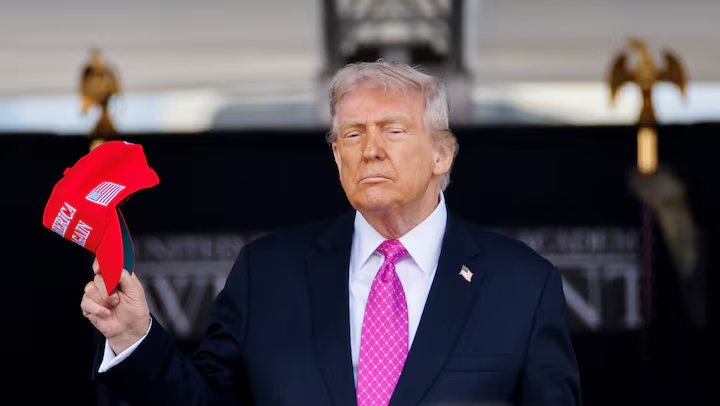In Trump's MAGA, the first internal cracks are visible

U.S. President Donald Trump holds a 'Make America Great Again' (MAGA) hat as he attends the commencement ceremony at West Point Military Academy in West Point, New York, U.S., May 24, 2025. REUTERS/Eduardo Munoz
The MAGA (Make America Great Again) movement, a pillar of Donald Trump's policies, is beginning to show its first internal cracks. After Elon Musk's stormy exit from the scene, the crisis in the Middle East and the attack on Iran have caused ill-feeling to mount, which seems to be growing more and more in the ranks of the president's supporters. Thus, mounting criticism comes from former advisers (such as Steve Bannon) and political figures (such as House Representatives Marjorie Taylor Greene or Thomas Massie), as well as public figures such as journalist Tucker Carlson. Trump, in response, has decided to discard diplomatic avenues, responding in kind to all the criticism coming from within his own movement. The creaks within MAGA are thus growing louder and louder.
Domestic tensions have exploded virulently in recent days, catalyzed by the crisis in the Middle East and the attack on Iran, and are hitting hard, risking a split in the conservative base and leadership. Trump's uncompromising rhetoric and “solo” management, once strengths, are now proving to be catalysts for a growing discontent that, after the well-known diatribe with Elon Musk, is eroding the foundations of his own movement. Some of those who defended the president in the clash with the billionaire who heads Tesla are now criticizing him: Steve Bannon, for example, stated on his podcast that the attack on Iran may not have been a correct decision with respect to the MAGA platform's will, questioning the decision with respect to loyalty and consistency with what was announced on the campaign trail with respect to international relations and the continuing U.S. wars.
The most striking case of this internal rift within the movement is the clash with Tucker Carlson. Already critical of Trump for his blind support of Israel (he had called Trump “complicit” when Israel attacked Iran), Carlson has now expressed his full disapproval of the U.S. bombing of Iranian atomic power plants. Trump responded with a post on his Truth social, calling him “crazy.” A few days earlier, Carlson had also invited Ted Cruz, a Republican senator, ultra-conservative reactionary of the Christian Religious Right and hawk of the war on Iran, to his program. During the broadcast, Carlson asked Cruz a long series of questions about Iran, which the senator could not answer. Whereupon, Carlson asked him, “You want to bomb a country you know nothing about?”
Even Alex Jones, a controversial but influential figure for part of the MAGA base, who had previously advanced criticism by calling Trump's deportation plan “really bad,” has come to the defense of Carlson and his position with respect to Iran. This indicates that dissent is spreading even to figures whose anti-establishment nature would theoretically align with Trump's more extreme positions. And the dissent is not just outside, on the screens and in the channels that Trump's base follows. Even within Congress, there are those who pose heavy criticism. Marjorie Taylor Greene, another MAGA loyalist and a House representative, publicly defended Carlson and wrote a lengthy post on X in which she criticized the U.S. attack, the beginning of which reads, “I don't know anyone in America who has been a victim of Iran.” Last week, Republican Representative Thomas Massie had announced, along with several Democrats, that he had introduced a bipartisan war powers resolution so that congressional authorization would be required for any hostile act against Iran. On June 22, Trump responded to Massie through a lengthy post on Truth in which he ridiculed and discredited him.
This division is not a mere shade of opinion, but a strategic and ideological discord that calls into question the cohesion of a front that has always made compactness its strong point. The reasons for this rift are multiple and complex. On the one hand, there is an isolationist and America First base that, while supporting Trump, feels betrayed by a perceived excessive involvement in the Middle East crisis. For this part of the base, which we might call isolationist, priorities should remain domestic, and any deviation from this principle is seen as a betrayal of MAGA ideals. On the other hand, Trump's personality, his propensity for impromptu decision-making and his impatience with dissent are wearing down the patience of even historic allies. The once granitic MAGA front is showing significant cracks.
https://www.reddit.com/r/EnoughTrumpSpam/comments/1lk092r/in_trumps_maga_the_first_internal_cracks_are/
This post has been shared on Reddit by @davideownzall through the HivePosh initiative.